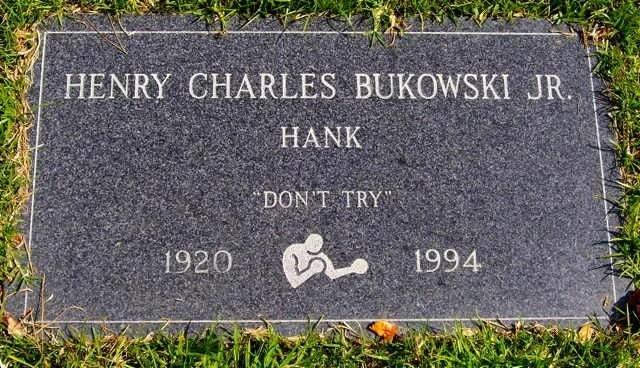How to Succeed by Not Trying
Most of us have been taught that success comes from effort.
Try harder. Push through. Force yourself to make it happen.
And yet, for some reason, the harder we try, the more stuck we feel.
We overthink every move. We grip so tightly to an outcome that we choke the life out of it. We try to force results, and in doing so, we ignore the reality in front of us.
What if the real key to success isn’t trying harder—but trying differently?
Let’s talk about how not trying can actually help you succeed.
Bukowski’s Advice: Don’t Try
Bukowski’s gravestone reads: "Don’t Try."
A bold life motto, especially from a guy who claimed that drinking alcohol was a necessity for his wellbeing.
Now, I’m not saying to take career advice from a man who lived off whiskey and cigarette smoke—
what I am saying this:
He spent his life doing exactly what he wanted.
He wrote poetry that still resonates decades later.
And whether you love or hate him, he lived a life that was truly his.
He once wrote: "Find what you love and let it kill you."
Maybe the goal isn’t struggling for success. Maybe the goal is living in a way that makes it inevitable.
The Problem With Trying So Hard
Let’s talk about job interviews.
You want the job. You really, really want the job.
So you prepare. You rehearse your answers. You make sure you sound competent, confident, and exactly like the candidate they’re looking for.
And when you walk into the room?
You’re performing. You’re so focused on winning the job that you don’t even notice whether you’d actually want it.
You become hyper-aware of how they see you, overanalyze their reactions, and start adjusting yourself to fit whatever you think they want.
By the end of the interview, you’re exhausted.
And worse? You have no idea if they actually liked you—because you weren’t really showing up as yourself.
This is what happens when we try to force an outcome.
Instead of focusing on who we want to be in a situation, we become obsessed with getting the right result.
And in doing so, we disconnect from reality and lose the very thing that could have helped us—presence.
You Don’t Control Outcomes—But You Do Control Who You Are
Here’s the paradox: The more you try to make something happen, the less control you actually have.
Because you don’t control outcomes.
You don’t control whether you get the job.
You don’t control how others react to you.
You don’t control if things go exactly as planned.
What you do control? How you show up.
Do I want to lead with honesty or performance?
Do I want to choose courage or self-doubt?
Do I want to align with my values, no matter the result?
Because when you focus on being instead of forcing, something strange happens:
You actually see what’s in front of you.
You adapt. You adjust. You take the next step based on reality, not fear.
And that leads to better results than control ever could.
The "Not Trying" Approach to Success
This doesn’t mean doing nothing. It means letting go of forcing.
Take any situation where you feel stuck and shift your approach:
Instead of trying to prove your worth in a job interview, focus on showing up in a way that reflects your actual skills and personality.
Instead of trying to get someone to like you, focus on being the kind of person you’re proud of.
Instead of trying to eliminate anxiety, focus on responding to it in a way that builds self-trust.
And then?
See what happens.
The outcome isn’t something to control—it’s data. It tells you what’s working, what isn’t, and what your next step should be.
When you stop trying to force things, you free yourself to actually respond to them.
And that’s what creates real progress.
Final Thoughts: Success Isn’t Forced, It’s Built
Bukowski was right—"Don’t try."
Not because effort isn’t important, but because effort without presence is wasted energy.
The most successful people aren’t the ones gripping the wheel with white knuckles, desperately trying to steer life in a specific direction.
They’re the ones who stay engaged with what’s actually happening, adjust when needed, and take the next step with clarity.
So if you feel stuck, ask yourself:
Are you trying to force an outcome—or are you focusing on who you want to be in this moment?
Because when you trust that, you won’t have to force success.
It will find you.
